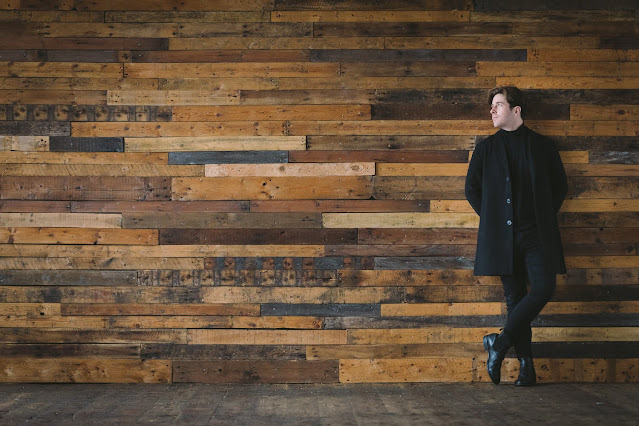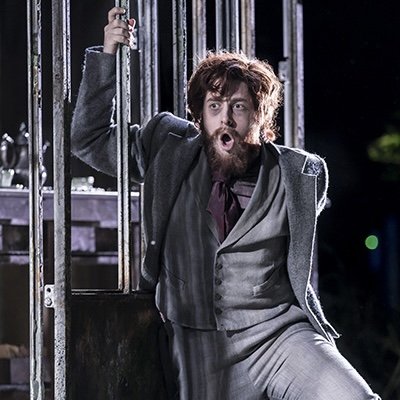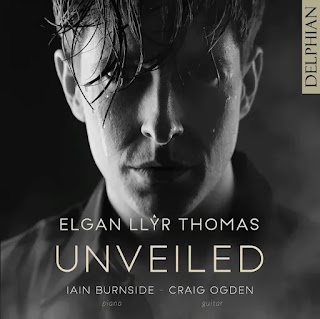 |
| Elgan Llŷr Thomas (Photo: Tom Gradwell Photography) |
Welsh tenor Elgan Llŷr Thomas' new disc on Delphian, launched at Wigmore Hall during Pride Month, is called Unveiled and features music by Britten, Ruth Gipps, Michael Tippett and Elgan himself performed with pianist Iain Burnside and guitarist Craig Ogden. Elgan's aim with the disc is to focus directly on queer British culture, focusing on LGBTQ+ composers and poets.
The disc is Elgan's first as a professional singer (he recorded a solo album of Welsh songs back in 2012), and the programme arose because he was growing frustrated with a lot of the roles that were offered to him. He has enjoyed the Britten roles that he has performed, but some of the others such as Almaviva (Rossini's Il barbiere di Siviglia), Nemorino (in L'elisir d'Amore) and Gilbert & Sullivan roles were fine enough but he did not love the repertoire. Performing some roles came alarmingly close to singing something so that it paid the bills, and he felt that his career was meant to be more than that, there should be joy. There is, sometimes, but there is hard work too.
The idea behind the disc was to tell people that there is a side to him that he wants to explore on stage and has not had much chance to do so. He spoke to pianist Iain Burnside about the project, and Iain was supportive. At an ENO Harewood Artists event at Wigmore Hall, Elgan performed four of Britten's Michelangelo Sonnets in new English translations by Jeremy Sams (Britten set Michelangelo's original Italian). He had never performed the songs before and found them amazing. Elgan was very struck by Jeremy Sams' translations, and he wondered how many people, listening to the original Italian versions, knew the history and significance of the songs.
The cycle, which Britten wrote for Peter Pears in 1940, sets seven sonnets written by Michelangelo, love sonnets from a sequence Michelangelo wrote to the young Roman patrician Tommaso dei Cavalieri who was over 30 years younger than Michelangelo. The homoerotic nature of the poems themselves has caused some discomfort in the past, with Michelangelo's grand-nephew publishing them with the gender of pronouns changed, and it was not until John Addington Symonds translated them into English in 1893 that the original genders were restored.
Elgan asked Jeremy Sams to translate the three songs that he had not already put into English, and Britten's Seven Sonnets of Michelangelo became the initial focus of the album. When considering what else to record, Iain Burnside advised Elgan to think out of the box. Classic repertoire has been recorded extensively by many big names, so for a first album, it is difficult for a young singer to be able to make a mark here. Elgan decided to focus on music by gay or bi-sexual composers and poets, though he has been using the term queer because he feels that this better describes the sexuality of someone like Rupert Brooke who was fluid, having relationships with both men and women.
Elgan had performed Michael Tippett's Songs for Achilles with guitarist Sean Shibe at the Ludlow English Song Weekend, and he had loved them. Work is something of a pendant to Tippett's opera, King Priam, taking music from the opera but developing the character further. The songs were premiered in 1961 by Peter Pears and Julian Bream. They were also a very good fit to the theme of the disc, after all, Tippett was one of the few composers at the time to have a gay character in his operas. It also helped that Elgan had read Madeleine Miller's novel, The Song of Achilles, before singing Tippett's songs. And that the songs use guitar accompaniment rather than piano meant that they would bring a change of texture on a disc that Elgan admits is not always easy listening.
-6.jpg) |
| Unveiled - recording sessions with Craig Ogden & Elgan Llŷr Thomas (Photo: foxbrush.co.uk) |
He then went looking for another composer to put alongside Britten and Tippett, searching for their contemporaries, focusing on women composers and came across Ruth Gipps. He had no prior idea about her, yet found her Four Songs of Youth which date from 1940, the same year as Britten's cycle, and they were also for tenor and piano. Gipps was only 19 when she wrote the songs, yet here was repertoire worth exploring. That the songs set poems by Rupert Brooke tied into the theme. Brooke is a poet who is famous, yet people are not familiar with much of his work. And the first and last songs, Failure and Peace 1914, Elgan found very much on point, they really spoke to him. And there is virtually nothing of Ruth Gipps' song output on disc, Roderick Williams just pipped Elgan to the post in releasing the first recording of one of her songs.
The whole point of the disc is to challenge the listener, to show that songs we think we know, we don't quite.
Elgan did a composition elective as an undergraduate, studying with David Horne who gave him confidence in his compositions. Composition is something that he enjoyed, but with his singing career, he never had time. During COVID he started arranging songs, and Iain Burnside suggested Elgan write something for the disc. Elgan shied away from the idea at first, it seemed like an audacity, but Iain Burnside encourage him and he had faith that if Iain Burnside and Delphian did not like the songs, they would tell him.
Andrew McMillan is a poet whose work Elgan was familiar with but there was nothing of his that would be enhanced by being set to music. Elgan contacted the poet who sent him a set of poems written in response to Matthew Bourne's Swan Lake (which has a male dancer playing the swan). Elgan found the poems musical and witty, they talked about themes from the album but in a more contemporary, explicit way.
-31.jpg) |
| Unveiled - recording session with Iain Burnside & Elgan Llŷr Thomas (Photo: foxbrush.co.uk) |
Elgan tried setting McMillan's poems and was happy, he wrote the songs to be accessible, for people not ordinarily listening to classical music, which might potentially attract those that never heard classical music before. Harmonically the songs needed to feel familiar, and as well as the obvious quotations from Tchaikovsky and from Wagner's Lohengrin, there is a lot of Jason Robert Brown, Stephen Sondheim, Jonathan Dove, and Britten, not quotations but the songs are heavily influenced. He decided he had to back himself. He says that whilst not every song is as good as the other cycles, they stand up on their own within the album.
Whilst studying, every song he learned had been performed 1000 times already. He wrote Swan to all to the repertoire. He wanted to write something that people could relate to.
The album became something else; he happened to be able to find songs that fitted with the theme of the sonnets. He included William Dennis Browne's To Gratiana Dancing and Singing as a sort of break in the programme, something familiar, loosely linked because of his friendship with Rupert Brooke.
I was curious as to whether Britten would have approved of the translations of the sonnets, making the implicit more explicit. Elgan comments that Peter Pears wasn't as conservative as Britten, he was more out there. In fact, Pears did translate the songs, but the translations were not to be sung. Britten lived to see the 1967 Act, but by that point, it was so ingrained, life had been secret. But the wonderful thing is they don't need Britten's approval, yet Elgan feels that Britten would have been very behind the idea. The response to the songs in English has been very positive, Elgan hopes that Britten would hear the translations and be happy, they help show why he chose to set the sonnets.
 |
| Elgan Llŷr Thomas as Inkslinger in Britten's Paul Bunyan - ENO at Wilton’s Music Hall (Photo: Genevieve Girling) |
Elgan feels that the sonnets are linked to Britten's relationship with Wulff Scherchen, a young German man with whom Britten lived for two years (though in later life Scherchen said there was no sexual relationship). Elgan sees the first five sonnets, which are dark, full of shame and secrets, as being linked to Scherchen whilst in the last two, the tone shifts entirely, and this could be construed as suggesting Britten's burgeoning relationship with Pears. Jeremy Sams' translation makes more immediate what is there already.
For Elgan, the album isn't about getting rid of repertoire but adding to it. He has performed Peter Quint in Britten's Turn of the Screw, Inkslinger in Paul Bunyan and the title role in Albert Herring, and he enjoys getting to play more gay characters. Quint is the darkest of the three, whilst Inkslinger is something of a cypher for Auden (who wrote the libretto), not explicitly gay but there is a lot that Elgan can draw on from his experiences.
Some stories in opera, we have heard 1000 times and perhaps we are telling them too much. Five opera companies are doing Puccini's La Boheme. Elgan understands, it sells tickets, but asks if that is all we can do. After all, art is meant to be evolving. Puccini and Mozart were writing for their lifetimes. Let us perform their music, by all means, but we need to up the efforts to commission contemporary stories that are relevant to the areas that are the opera companies' core audience. And he points out that at the Met in New York, Verdi's Don Carlo was struggling to sell tickets whilst Kevin Puts' The Hours sold out. Elgan is a former ENO Harewood Artist, and points out the irony of the company making real efforts in this regard yet being seemingly punished by Arts Council England for 'I don't know what'.
 |
| Elgan Llŷr Thomas as Peter Quint in Britten's Turn of the Screw ENO and Regent’s Park Theatre (Photo: Johan Persson) |
But a lot of interesting things are happening. Last year, La Boheme was performed in a new version with two tenors at the King's Head, something that works with the tenor voice. Elgan loves the idea of doing things in a different way, but he is worried that people might think that this is enough. It is not just queer or other diversity, not just diversity in the cast or roles, but we need to have opera that demands diversity in the first place and perform it alongside the classical repertoire.
Poul Ruders' The Handmaids Tale at ENO sold well [see my review], but people know it from the book and the TV series. If people have heard of the book, then it is a way in and may bring them back to opera again.
Today, opera is so not a part of people's lives. He lives in a safely middle-class area and few of his neighbours have seen an opera.
Coming up, Elgan is performing the role of Prunier in Opera North's new production of Puccini's La Rondine, (which opens at the Grand Theatre, Leeds on 20 October 2023) a role he is looking forward to and one that he never thought he would perform.
Unveiled - Britten: Seven Sonnets of Michelangelo, Michael Tippett: Songs for Achilles, Ruth Gipps: Four Songs of Youth, William Denis Brown: To Gratiana singing and dancing, Elgan Llŷr Thomas: Swan - Elgan Llŷr Thomas, Iain Burnside, Craig Ogden - Delphian [Link Tree]
Support Planet Hugill: Buy Unveiled from AmazonNever miss out on future posts by following us
The blog is free, but I'd be delighted if you were to show your appreciation by buying me a coffee.
Elsewhere on this blog
- Back into the film studio: Puccini's La Boheme at Opera Holland Park on a 1950s Italian film set - opera review
- Forget Callas and Italian bel canto: Christophe Rousset & les Talens Lyriques reveal the distinctive drama of Spontini's La Vestale - record revew
- Tony Cooper relishes Sofia Opera's brand-new Ring which has been an all-round exercise in good artistic management coupled with cooperative staff teamwork - opera review
- Overwhelmingly intense electronic sound worlds from marginalised voices: Nonclassical's Disruptive Frequencies at Kings Place - concert review
- Carmen in in the Quarry: Arnaud Bernard transforms Bizet's opera into film set in 1930s-era Spain on Oper im Steinbruch's spectacular stage - opera review
- There are things to discover still: Benjamin Appl on exploring themes of temptation and seduction in his latest album, Forbidden Fruit -interview
- An engaging and eclectic selection: Soar from Alastair Penman and Jonathan Pease - record review
- Any performance of Verdi's Don Carlo is an event: Verdi's large-scale drama returns to Covent Garden with Lise Davidsen and Brian Jagde - opera review
- An engaging diversity & fierce intelligence: the piano music of Bernard Hughes played by Matthew Mills - record review
- Imagination and seduction: Huw Wiggin in Rhapsody, music Debussy, Joseph Phibbs, Iain Farrington, Coates, Jennifer Watson, and Liszt - record review
- Heard in her own right: an important new disc explores Fanny Hensel's songs, focusing on the unknown and unrecorded - record review
- Home












No comments:
Post a Comment